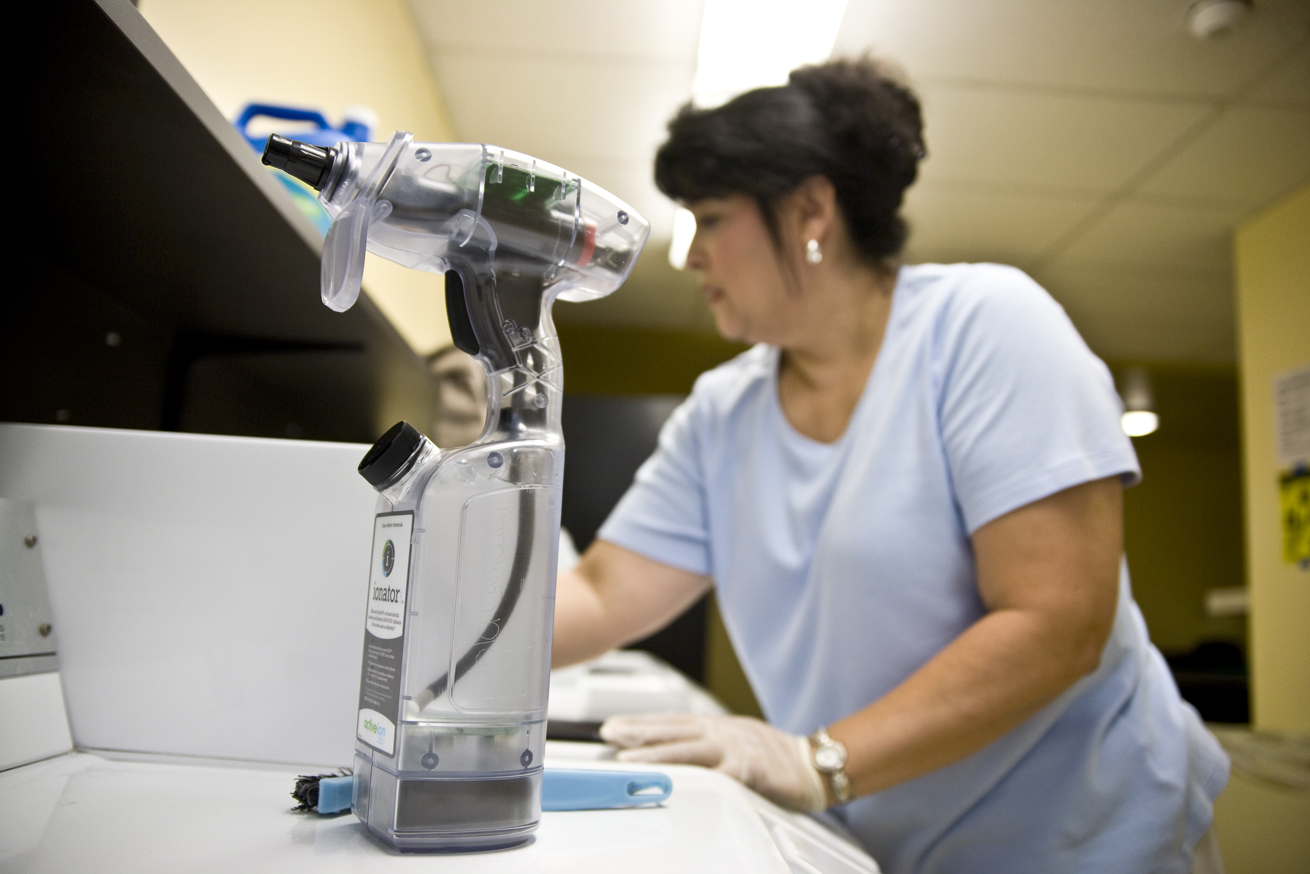Biola continues its efforts to become a greener campus with recently added cleaning supplies free of chemicals, biodegradable coffee cups and organic produce grown on campus.
Reducing Chemicals Through New Supplies
A year ago, Biola’s Custodial Services introduced its cleaning staff to Ionator, which ionizes tap water to clean and sanitize multiple surfaces. This year, Biola bought 30 ionators to replace harsh cleaning chemicals and gained the convenience of having one device that cleans floors and countertops alike.
“The custodial staff absolutely loves them,” operations manager Beverly Cain said. “When we first got them, all the staff was fighting to use them because they clean so well and the custodians don’t have to change applications to clean different surfaces.”
The ionators cost $300 each but are an investment into getting rid of multiple chemical cleaners, Cain said.
“I like them because they clean very well,” said Amanda Turner, who cleans in Horton Hall. “They don’t use any chemicals, so there is no chemical residue and they will save a lot of money that would have been spent on those chemicals.”
Freshmen Stephanie Hennin and Tabitha Chan said they thought the ionator was a brilliant device for cleaning the bathrooms. Hennin said there are already too many chemicals in people’s lives, so the chemical-free ionator was a step in the right direction.
“I actually think it’s a great idea,” Chan said. “Personally, I have very sensitive skin, and I might be allergic to the cleaning chemicals.”
Other places on campus have opted for more green products, as well.
Corn-based Coffee Cups
Common Grounds now uses environmentally friendly coffee cups, lids and straws and has changed its coffee supplier to Seattle’s Best Coffee. The coffee company only purchases its coffee beans from growers who are committed to fair and sustainable farming practices.
Common Grounds employee, senior Veronica Castillo, said the new green cups and lids are 100 percent renewable and biodegradable. The new straws are plant-based, specifically corn-based, and are also completely biodegradable.
Pesticide-free Veggies
Meanwhile, green continues to burst forth on campus with Biola’s vegetable garden. Located next to the Alpha Chi parking lot, the garden boasts a variety of vegetables that grow pesticide free.
“I know some folks think ‘tree hugger’ when organic is mentioned, but for me it’s eating produce without pesticides and herbicides on it,” environmental science professor Mark McReynolds said. “It’s about knowing no farm workers had to dress up in a Hazmat suit to put chemicals on the produce I’m going to eat.”
The garden was started by biological science professor. Jason Tresser and is cared for by volunteer students who visit the garden daily to water and care for the vegetables.
“I worked the garden at my last school and I wanted to continue working with plants here,” said junior Alexis Casiday. “I was told that some of the vegetables eaten from the Caf come from this garden.”
Going Green vs. Creation Care
Though many people would view the organic garden and environmentally friendly projects as taking steps in the right direction, McReynolds said Christians often associate the stigma of the 60s hippie era with the modern-day environmental movement, commonly referred to as “going green.”
“Well I prefer to talk about caring for creation or good stewardship of God’s creation,” McReynolds said. “‘Going green’ sounds too secular here at Biola, but it seems clear by looking around that God likes that color.”
The “go green” movement has caused many Christians to address their stance on environmental issues and what a Christian’s role should be concerning the environment.
“Evangelical Christians have been slow to move toward creation care, but that is changing,” McReynolds said. “A growing number of evangelicals are seeing creation care as something the church should be involved in.”
Student Opinions on Creation Care
Biola’s effort to be a good steward has also caused students to evaluate their roles in God’s creation.
“I’m not a very active ‘go green’ person, but I definitely support efforts to make the planet better,” Common Grounds employee, junior Candace Arce-Lindsay said. “We are here in charge of this planet and God’s creation, and we need to take care of it as much as possible.”
Arce-Lindsay said she thinks Biola sincerely wants to take care of God’s creation and that she appreciates the steps Biola is taking to make the campus more environmentally friendly.
“I don’t think Biola is just following a trend,” Arce-Lindsay said. “A lot of the time people see it as a trendy thing, like when everybody goes out and buys TOMS, but I think it’s a good thing that needs to be done.”
Other students said they worried the planet would come first in priority before people.
“I think it depends,” graduate student Mariyam Yohannis said. “If there are students who need scholarships, Biola should use the money to help them instead of spending it on environmental things.”







